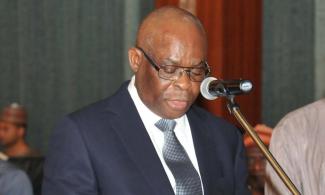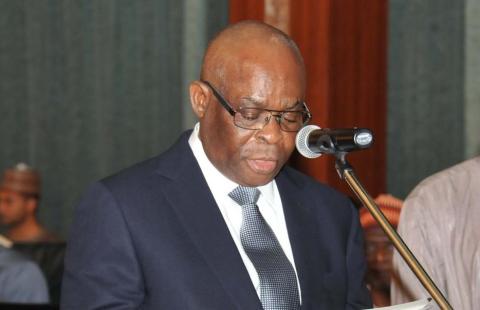

The Chief Justice of Nigeria, Justice Walter Onnoghen is facing the battle of his political carreer. He was one of the judges indicted for corruption and recommended for dismissal by the the Justice Kayode Eso Panel set up by the Sani Abacha military regime to probe incessant allegations of judicial corruption in 1994. Justice Onnoghen was then a judge in the Cross River State high court where he was accused of selling justice to the highest bidder. Luckily for Justice Onnoghen he had been promoted to the Court of Appeal when the implementation of the recommendation of the Eso Panel was carried out against only judges of high courts across the country.
As the leopard never changes its colour Justice Onnoghen has continued with corrupt practices. The judge has not been able to account for the millions of Naira, Pounds Sterling, Dollars and Euros in his bank accounts. The money is so much for a serving judge that Justice Onnoghen did not declare some of his bank accounts as required by law. Hence, the Chief Justice was charged with failure to false declaration and failure to declare his assets containing hundreds of over $3 million of dollars before the Code of Conduct Tribunal last week. It has also been alleged that for 18 months the Chief Justice did not withdraw from his salary account, suggesting that he was spending bribe money.
Although the petition was received by the Code of Conduct from an ex aide of President Buhari on January 9, 2019. A team of officials from the Code of Conduct Bureau visited the Chief Justice on January 10. When confronted with the fact that he did not declare his assets as stipulated as stipulated by the Constitution the Chief Justice said that he "forgot" to have done so. He therefore pleaded for the "understanding and cooperation" of the Code of Conduct Bureau officials. The official promised to coopetate but asked the Chief Justice to write a statement under caution. He did so in his own handwriting where he admitted that he "forgot" to declare his assets.
Based on the admission by the Chief Justice that he did not declare his assets the Bureau quickly prepared a charge and filed it before the Code of Conduct Tribunal on January 11. The Tribunal fixed the case for the arraignment of the Chief Justice for January 15. To avoid the disgrace of being arraigned at the Tribunal the Chief Justice was advised to stay away from the proceedings of the Tribunal which he did. In a counter move, the legal team of the Chief Justice informed the Tribunal that their client had not been served with the charge sheet. The case was adjourned to January 22 for hearing after which proper service would have been effected on the Chief Justice.
Meanwhile, a case filed on Monday, January 15 at the federal high court to stop the trial of the Chief Justice through two NGOs were assigned to a judge, Justice N. E. Maha, a newly appointed judge in the court. We have confirmed that Justice Maha is very close to the Chief Justice as a former staff in the office of the Legal Practioners Privileges Committee located in the Supreme Court complex in Abuja. The Committee is headed by the Chief Justice. Within minutes of receiving the file of the new suit it was heard by Justice Maha who quickly granted a motion ex parte in the case. The judge restrained the Code of Conduct Tribunal from proceeding to hear the charge against the Chief Justice until the hearing of the motion on notice.
Not sure that the order of Justice Maha was sufficient to shield him from prosecution before the Code of Conduct Tribunal the Chief Justice planned another strategy. He held a meeting with Justice Babatunde Adejumo, the President of the National Industrial Court whose wife, Justice Abimbola Adejumo had delivered the judgment in the case of Nganjiwa v Federal Republic of Nigeria which ruled that all corruption cases involving judges should be reported to the National Judicial Council which is headed by the Chief Justice. The judgment was delivered to prevent the arrest and prosecution of judges as was witnessed in 2016 when about 10 judges were arrested and charged to court for corruption.
At the end of the meeting which held in Abuja last Sunday the embattled Chief Justice asked Justice Adejumo to get an order to prevent his arrest by the police, efcc or icpc. A case was filed the following day at the National Industrial Court . It was hurriedly assigned to Justice Sanusi Kano by Justice Adejumo. The case was heard by Justice who granted an order restraining the Police from arresting the Chief Justice pending the hearing and determination of the motion on notice. The judge also stopped the trial of the Chief Justice by the Code of Conduct Tribunal. Lawyers and judges are asking if the Chief Justice has become an employee to have his case decided at the National Industrial Court established to hear only trade union and labour matters.
In a desperate move to save Chief Justice Walter Onnoghen from prosecution and compulsory retirement the Body of SenIor Advocates of Nigeria (BOSAN) had called an emergency meeting of Senior Advocates of Nigeria to hold at the Lagos campus of the Nigerian Law School at 11 am on Saturday, 19th day of January 2019. But the communique of the meeting was prepared in advance and surreptitiously passed to the secretariat of the body for adoption at the meeting. The meeting was poorly attended by senior advocates.
But the few members of the body who attended the meeting kicked against the move to use the BOSAN to condemn the trial of the Chief Justice whose conduct was criticised at the meeting by many senior advocates. It was the view of the majority of those who attended the meeting that while the procedure adopted by the Executive in charging the Chief Justice before the Code of Conduct Tribunal is procedurally wrong they wondered when forgetfulness became a defence to a criminal offence in Nigeria. The suggestion that the N1.4 billion money laundering charge filed against the NBA president, Mr. Paul Usoro SAN by the efcc be tabled for discussion was unanimously rejected by members of BOSAN.
It was a very somber meeting as members expressed concern over the damage being done to the reputation of the legal profession by senior judges and lawyers. In order not to be accused of covering the Chief Justice who cannot explain the sources of the local and foreign currencies in his declared and undeclared bank accounts the BOSAN dropped the prepared communique and issued another one which tactically called for caution by all the parties concerned. The communique was signed by Professor Ben Nwabueze SAN and Seyi Sowemimo SAN, the Chairman and Secretary respectively of BOSAN.
Even though the federal government has denied the reported plan to arrest the Chief Justice, the National Financial Intelligence Unit has frozen his accounts under the Presidential Executive Order No 6 of 2018. An application has slredy been filed in court to have the Chief Justice removed from office since he has ignored the call of the federal government to call it quits.